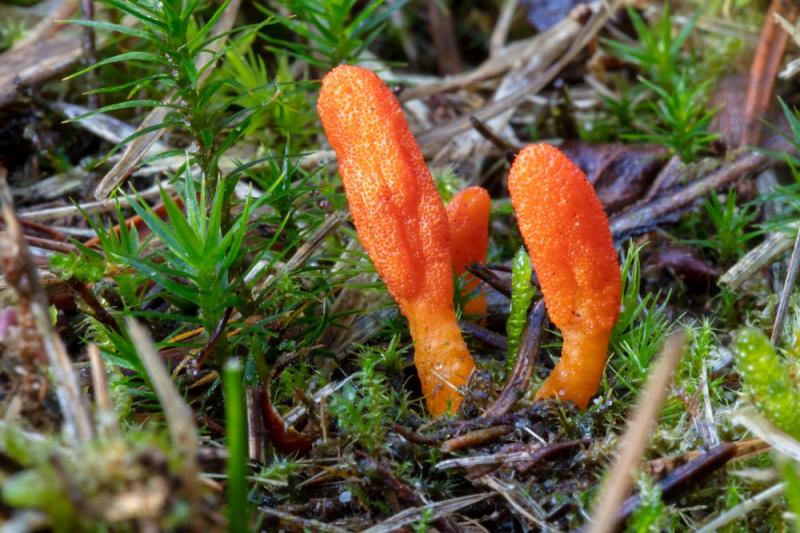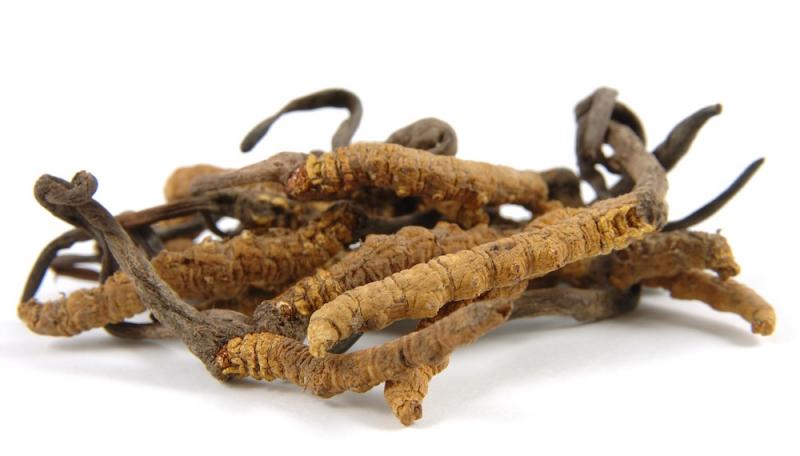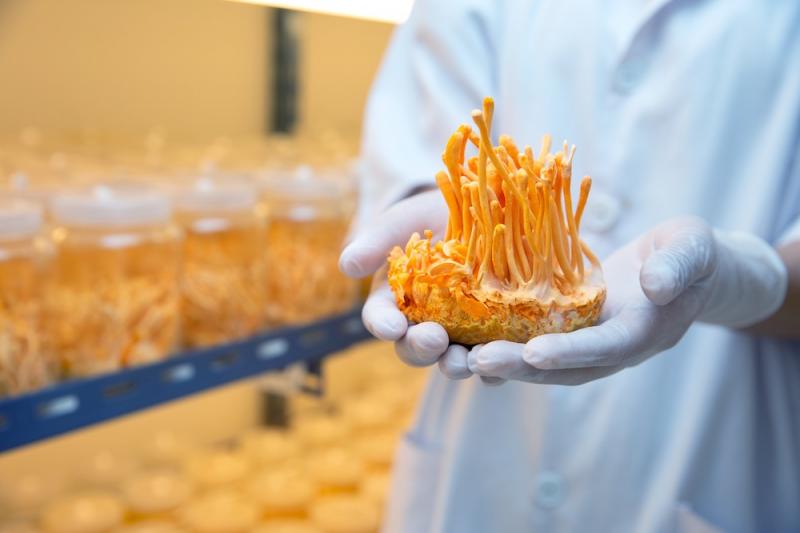
Cordyceps came to my attention in 2006 during a tour of China with Nature's Sunshine Products. The members of our group got the chance to be evaluated by a traditional Chinese doctor at a clinic in Beijing. I was fascinated to watch the doctors use Chinese pulse diagnosis to recommend various herbs and I was looking forward to my turn to be evaluated. So, I was shocked when the doctor felt my pulse and didn’t recommend anything. He said I was fine. When I questioned him about this, he suggested I take cordyceps as a tonic. That didn’t surprise me because they were recommending that herb to just about everyone. Since then it has become one of the adaptogens I’ve taken most often.
Although the plant has a long history of use, little was known about it in the West. Attention was drawn to it in 1993 when the Chinese women’s track team beat nine world records. It was attributed to their use of cordyceps, which acts as an adaptogenic tonic to improve athletic performance and general health.
About Cordyceps
 Cordyceps is a fascinating medicinal fungus. In the wild, it grows on the larvae of hibernating caterpillars. The fungus invades the caterpillar while it is hibernating underground and consumes it. The result is a caterpillar-shaped mushroom. In the spring, it puts up a stem-like shoot, which gives the herb its Chinese name—dong chong xia cao. Literally translated this means, “winter worm, summer grass.”
Cordyceps is a fascinating medicinal fungus. In the wild, it grows on the larvae of hibernating caterpillars. The fungus invades the caterpillar while it is hibernating underground and consumes it. The result is a caterpillar-shaped mushroom. In the spring, it puts up a stem-like shoot, which gives the herb its Chinese name—dong chong xia cao. Literally translated this means, “winter worm, summer grass.”
Wild cordyceps grows only in high-altitude environments in southwestern China, Nepal, and Tibet. The wildcrafted herb is rare and expensive, but a modern process has been developed to grow the fungus commercially, making the supplement more available and affordable.
Tonic Effect of Cordyceps
 Cordyceps is an energy tonic in Chinese medicine that balances both the yin and the yang energy. This means it can be taken by just about anyone. It particularly supports the Chinese kidney (water energy) and lung (metal energy). That’s why I like it as I have weakness in both my kidneys and my lungs which shows up in my iris and in the types of symptoms to which I’m prone.
Cordyceps is an energy tonic in Chinese medicine that balances both the yin and the yang energy. This means it can be taken by just about anyone. It particularly supports the Chinese kidney (water energy) and lung (metal energy). That’s why I like it as I have weakness in both my kidneys and my lungs which shows up in my iris and in the types of symptoms to which I’m prone.
The Chinese kidney system includes aspects of adrenal function because it relates to basic energy and stamina. There is also an aspect of reproductive function in the Chinese kidney system and cordyceps can help here as well. It has been shown to stimulate testosterone production in laboratory animals and in another study, it increased a type of estrogen essential to fertility. This correlates with its Chinese reputation as a tonic for sexual weakness and reduced libido.
Cordyceps and the Lungs
 The lung or metal energy in the Chinese system relates to the immune function in Western medicine. Cordyceps enhances the ability of the body to prevent and fight infection. It is a helpful tonic for people who have weak lungs and are constantly getting sick.
The lung or metal energy in the Chinese system relates to the immune function in Western medicine. Cordyceps enhances the ability of the body to prevent and fight infection. It is a helpful tonic for people who have weak lungs and are constantly getting sick.
One benefit of cordyceps to the respiratory system is its ability to reduce inflammation in the lungs. This makes it beneficial for people with asthma, a use that has been confirmed with animal studies. It has also been beneficial for people with chronic obstructive pulmonary disease. Improvements in symptoms such as shortness of breath, cough, loss of appetite, and low energy have been reported.
Other Benefits of Cordyceps
Cordyceps is also beneficial for the immune system. It has immune-modulating properties, which means it can boost immunity in people who have a weakened immune system and also calm down a hyperactive immune system. Studies also suggest cordyceps may be helpful for systemic lupus, liver fibrosis, and hepatitis B patients. In addition, the fungus may enhance chemotherapy and reduce blood vessel growth to tumors.
Another area where cordyceps offers potential health benefits is the cardiovascular system. It has antioxidant properties and has been shown to lower cholesterol and blood pressure in laboratory animals. In one study, a dose of three to four grams (about six to eight capsules) proved beneficial for 64 patients with chronic heart disease. It appears to have a liver-protecting effect. It may also lower blood sugar and increase insulin sensitivity.
Using Cordyceps
All the properties mentioned above make cordyceps is a good remedy for the elderly. Doses of just three grams per day (about 6 capsules) have resulted in improvements in energy, libido, memory, tolerance to cold, and reductions in dizziness, tinnitus, and nighttime urination. A typical dose for enhancing respiratory or immune function would be 2-3 capsules three times daily.
Steven's Articles
October
-

-
Understanding Caffeine & Cellular Adaptation
Preserving the power of caffeine's buzz and the…
September
-

-
Horseradish
A pungent spice for aiding protein metabolism…
-

-
Banaba or Crepe Myrtle
A beautiful tree from Southeast Asia whose leaves…
August
-

-
Monkeyflowers
Flower essences to help see ourselves more clearly…
-

-
Mariposa Lilies
Strengthening the bond between mother and child…
-

-
The Noble Bay Leaf
A common kitchen herb for aiding digestion and…
-

-
Epimedium: Horny Goat Weed
A circulatory stimulant and kidney yang tonic…
July
-

-
The Medicinal and Nutritional Benefits of Apricots
A nutritious fruit and valuable medicinal seed for coughs
-

-
Dogwoods
Asian dogwood is used to stop excessive discharge,…
June
-

-
Neem: The Village Pharmacy
A popular Ayurvedic remedy for dental and immune…
-

-
Spilanthes: The Toothache Plant
A traditional remedy for teeth and gums, as well…
-

-
Forsythia
An anti-inflammatory, fever-reducing, and infection fighting herb
May
-

-
Buckwheat (Kashi)
A delicious, high protein, gluten-free, gut-healthy food
-

-
Leaky Gut Syndrome
Plugging the leaks on the underlying cause of…
-

-
Storksbill
An edible, medicinal, weedy herb, helpful for…

